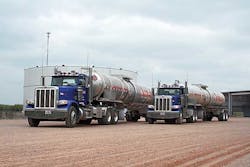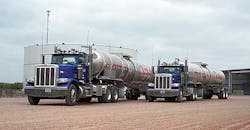Atlas Oil adds crude hauling to its oilfield transport, logistics portfolio
US energy independence is drawing closer, and the Atlas Oil Company leadership team wants their company to play a bigger role in helping the country reach that milestone.
To that end, the Taylor, Michiganbased diversified fuel supply and distribution company launched the new Atlas Oil Transloading & Logistics business unit.
The company expanded into crude oil hauling in the Victoria area of South Texas at the beginning of 2013, and the operation is growing fast. By early June, more than 50 crude transports will be in service. Management makes it clear that they plan to pursue crude hauling opportunities in other oil and gas shale regions.
Crude oil transloading activity continues at a brisk pace. Over the last three years, the company’s crude oil transloading operations have grown by 750%, a reflection of the explosive growth in US domestic crude production.
The company recently opened its fourth transloading site—the second of which is dedicated solely to crude oil shipped from West Texas.
“We were one of the early entrants to the crude transloading business,” says Sam Simon, chief executive officer and owner of Atlas Oil. “We gained valuable experience in the field as this business began to grow and expand as are now positioned very favorably. As this market continues to grow, we will be a top player.” Joining him in his optimism is Bob Kenyon, Atlas Oil executive vicepresident of sales and business development.
“We see plenty of great opportunities in the oilfield,” he says.“It seems like we hear about another new shale oil or gas discovery almost every quarter. I think there is more oilfield activity today than in the past 10 years, and we definitely want to be part of it.
“This is definitely a strategic business for us and a core competency. We want to make sure we pick the right opportunities that will enable us to grow in the right direction for the long term.”
Preferred partner
Kenyon adds that one of the trends he is seeing is the shift by exploration and production companies to select preferred partners for the long-term in the oilfield. “They want providers that can handle end-to-end logistics,” he says. “They want partners that can gather product in the field, move it to a trans shipment point, and move it to a destination that is as close as possible to a refinery.
“We are developing the logistics system that our customers have said they need. We currently serve our customers at the crude oil shipment origination points with trucking, transload, and railcar service. We’re working with customers to develop services on the destination side.” Oilfield operations currently are concentrated in Texas, but that probably will change this year, according to Keith Kronfeld, Atlas Oil’s director of transload operations. “We’ll grow more in Texas, but we also expect to launch crude oil logistics operations in the Midwest before the end of this year.”
One or two more crude oil transload facilities are in the works for this year.
In February, the company opened its newest crude oil transload location in Monahans, Texas. The other transload locations are in Odessa (crude oil) and La Feria (renewable fuels), Texas, and Albuquerque (renewable fuels), New Mexico.
“The new Monahans location offers plenty of room for expansion, with more than 75 acres of land,” Kronfeld says. “It is optimally located in the heart of major crude oil exploration and production near the Delaware and Permian basins. The Monahans location is 30 miles from our Odessa crude oil transload site and is served by the TNMR railroad.
“We’re now equipping our crude oil transload facilities with portable Lease Automatic Custody Transfer (LACT) units for the process of transferring the crude into rail tankcars for distribution to refineries along the The newest Heil crude oil trailers are double conical with a 10-inch drop to center. Capacity is 210 barrels (8,820 gallons), and the tanks are constructed of 5454-0 aluminum alloy.
A Roper product pump is powered hydraulically off the tractor. Tank hardware includes a Girard combination vacuum/pressure-relief vent, Civacon air-operated vapor vent, three-inch Betts Wet-R-Dry valve, Civacon API adapter with bubble sight glass.
For running gear Atlas Oil specifies the Hendrickson AAT250 air-ride suspension system. Steel disc wheels with Continental tires are used on the trailers.
“We’re going to continue adding to our fleet and driver force as we build this crude oil operation,” Kenyon says.
“This is a strategic business for us, and from our perspective, the Eagle Ford shale region is South Texas is still a booming opportunity. With more domestic crude coming out of the ground, we see plenty of transport opportunities well into the future.”
About the Author
Charles Wilson
Charles E. Wilson spent 31 years covering the tank truck, tank container, and storage terminal industries throughout North, South, and Central America as the editor of Bulk Transporter. Prior to 1989, Wilson was managing editor of Bulk Transporter and Refrigerated Transporter and associate editor of Trailer/Body Builders. Before joining the three publications in Houston TX, he wrote for various food industry trade publications in other parts of the country. Wilson has a bachelor's degree in journalism from the University of Kansas and served three years in the U.S. Army.

